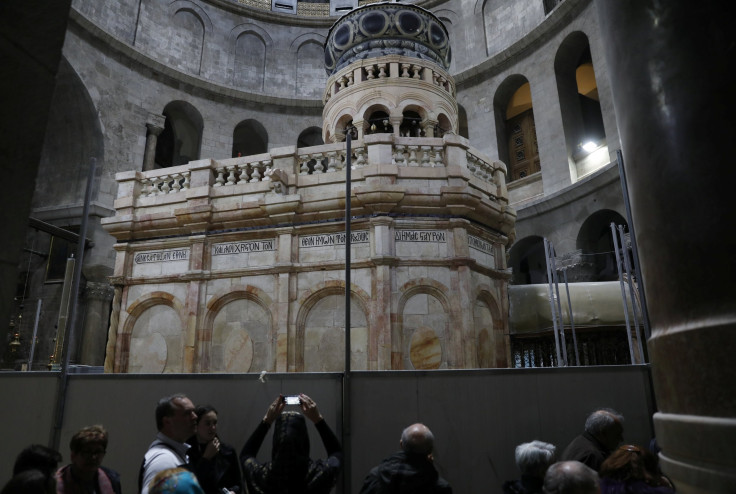Where Is Jesus' Tomb? Christ's Grave Restored For Public To Visit Burial Location

After thousands of years and an additional nine months of restoration work, the believed former resting place of Jesus Christ was scheduled to open for public viewing Wednesday at the Church of the Holy Sepulchre in Jerusalem’s Old City, Reuters reported Tuesday.
Researchers and archeologists in October first unearthed what they believed was a tomb that had contained the Christian deity’s body just below a marble cladding in the religion’s holiest site. Reports indicated the site had remained intact and the cladding had been in place since at least 1555.
Read: Islam World's Most Popular Religion?
The cladding was removed and revealed another marble slab, which was marked by a cross, and researchers took that off and speculated it may have been where Jesus was buried.
Ever since, conservation work was performed to preserve the grave, including a drainage system and masonry, Antonia Moropoulou, National Technical University of Athens professor and site director, said Monday, according to Reuters.
The project cost roughly $3.3 million and was funded by Christian sects as well as King Abdullah of Jordan.
The map below shows exactly where the church, and the alleged tomb, was in the Old City.
Though researchers could not confirm whether the site was, in fact, Jesus’ final resting place, they intended to work on it and make it viewable by the public, despite its location at the center of territorial strains among members of the Roman Catholic, Armenian and Greek Orthodox churches, each a long-running sect of Christianity.
The church’s history played a significant role in researchers’ conclusions. It was first erected under Constantine, the first Christian emperor, after he had a temple for the Roman goddess Venus taken down.
Read: San Francisco Law Against Trump's Muslim Registry
And while the site should undoubtedly be a significant destination for Christians, as well as tourists, it could cross over to worshippers from Judaism and Islam. Muslims believe Christ was not crucified and rather directly ascended to heaven, and he is considered a prophet. Jews doubted that Christ was the Son of God, one of the main tenets of Christianity, but some held the belief he was the messiah sent by God.
© Copyright IBTimes 2024. All rights reserved.











